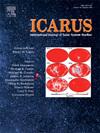Ab initio strewn field for small asteroids impacts
IF 2.5
2区 物理与天体物理
Q2 ASTRONOMY & ASTROPHYSICS
引用次数: 0
Abstract
In recent years, nine small near-Earth asteroids were discovered a few hours before the collision with the Earth: these are about one metre in diameter objects that have all disintegrated in the atmosphere, generating bright fireballs without causing damage. In some cases, several meteorites have been recovered. In cases like these, it is not always possible to triangulate the fireball generated by the asteroid’s fall to circumscribe the strewn field position. For this reason, it can be important to compute a strewn field “ab initio”, i.e. propagating the asteroid’s trajectory in the atmosphere starting from the initial conditions obtained directly from the heliocentric orbit, coupled with some reasonable hypothesis about the mean strength and the mass of the fragments to “sample” the strewn field. By adopting a simple fragmentation model coupled with a real atmospheric profile, useful results can be obtained to locate the strewn field, as we will show for the recent falls of asteroids 2024 BX1, 2023 CX1 and 2008 TC3. It was possible to locate the strewn field of our study cases with an uncertainty of the order of one kilometre with the mean strength in the range 0.5–5 MPa and the mass of the possible final fragments in the 1 g–1 kg range. We have also verified that a pancake phase after fragmentation is unnecessary to locate the strewn field for a small asteroid fall.
小行星撞击的 Ab initio 散射场
近年来,在与地球相撞前几小时发现了九颗小型近地小行星:这些小行星直径约一米,全部在大气层中解体,产生明亮的火球,但没有造成损害。在某些情况下,还找到了几块陨石。在这种情况下,并不总是能够对小行星坠落产生的火球进行三角测量,以确定散落的位置。因此,必须 "从头开始 "计算条裂场,即从直接从日心轨道获得的初始条件开始,在大气层中传播小行星的轨迹,再加上一些关于平均强度和碎片质量的合理假设,对条裂场进行 "取样"。通过采用一个简单的碎裂模型和一个真实的大气剖面,可以获得有用的结果来确定条纹场的位置,正如我们将展示的最近坠落的小行星 2024 BX1、2023 CX1 和 2008 TC3 的情况。在平均强度为 0.5-5 兆帕,最终碎片的质量为 1 克-1 千克的情况下,我们可以在不确定度为一千米的范围内确定我们研究案例中的条状磁场的位置。我们还验证了在小行星坠落过程中,碎裂后的饼状阶段不需要对条状磁场进行定位。
本文章由计算机程序翻译,如有差异,请以英文原文为准。
求助全文
约1分钟内获得全文
求助全文
来源期刊

Icarus
地学天文-天文与天体物理
CiteScore
6.30
自引率
18.80%
发文量
356
审稿时长
2-4 weeks
期刊介绍:
Icarus is devoted to the publication of original contributions in the field of Solar System studies. Manuscripts reporting the results of new research - observational, experimental, or theoretical - concerning the astronomy, geology, meteorology, physics, chemistry, biology, and other scientific aspects of our Solar System or extrasolar systems are welcome. The journal generally does not publish papers devoted exclusively to the Sun, the Earth, celestial mechanics, meteoritics, or astrophysics. Icarus does not publish papers that provide "improved" versions of Bode''s law, or other numerical relations, without a sound physical basis. Icarus does not publish meeting announcements or general notices. Reviews, historical papers, and manuscripts describing spacecraft instrumentation may be considered, but only with prior approval of the editor. An entire issue of the journal is occasionally devoted to a single subject, usually arising from a conference on the same topic. The language of publication is English. American or British usage is accepted, but not a mixture of these.
 求助内容:
求助内容: 应助结果提醒方式:
应助结果提醒方式:


